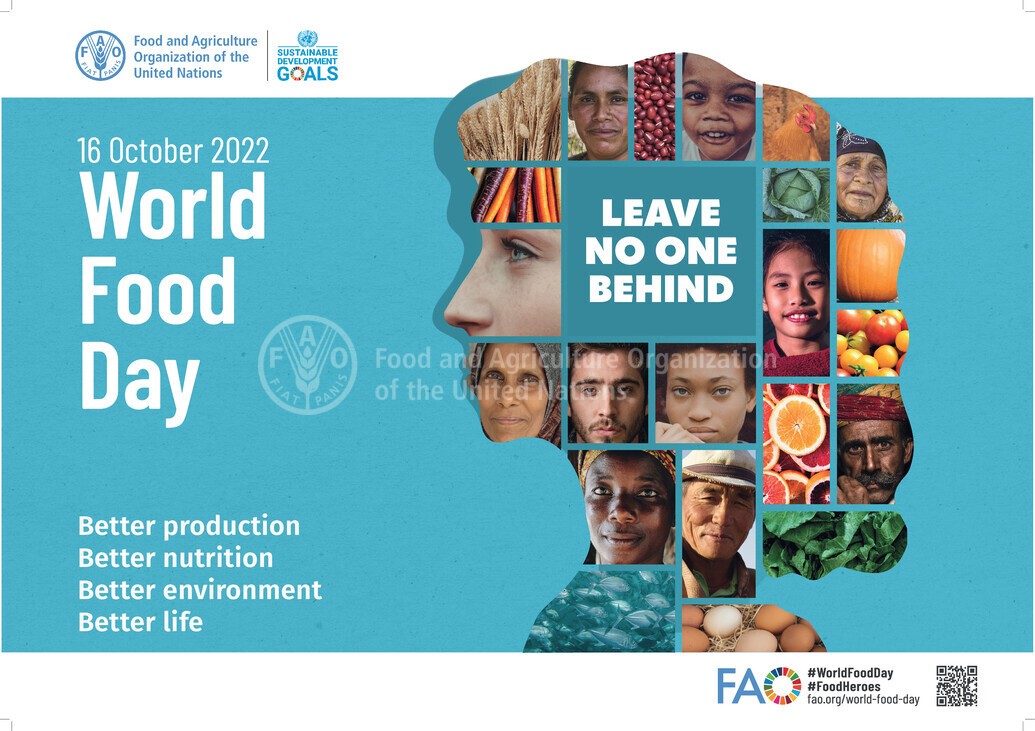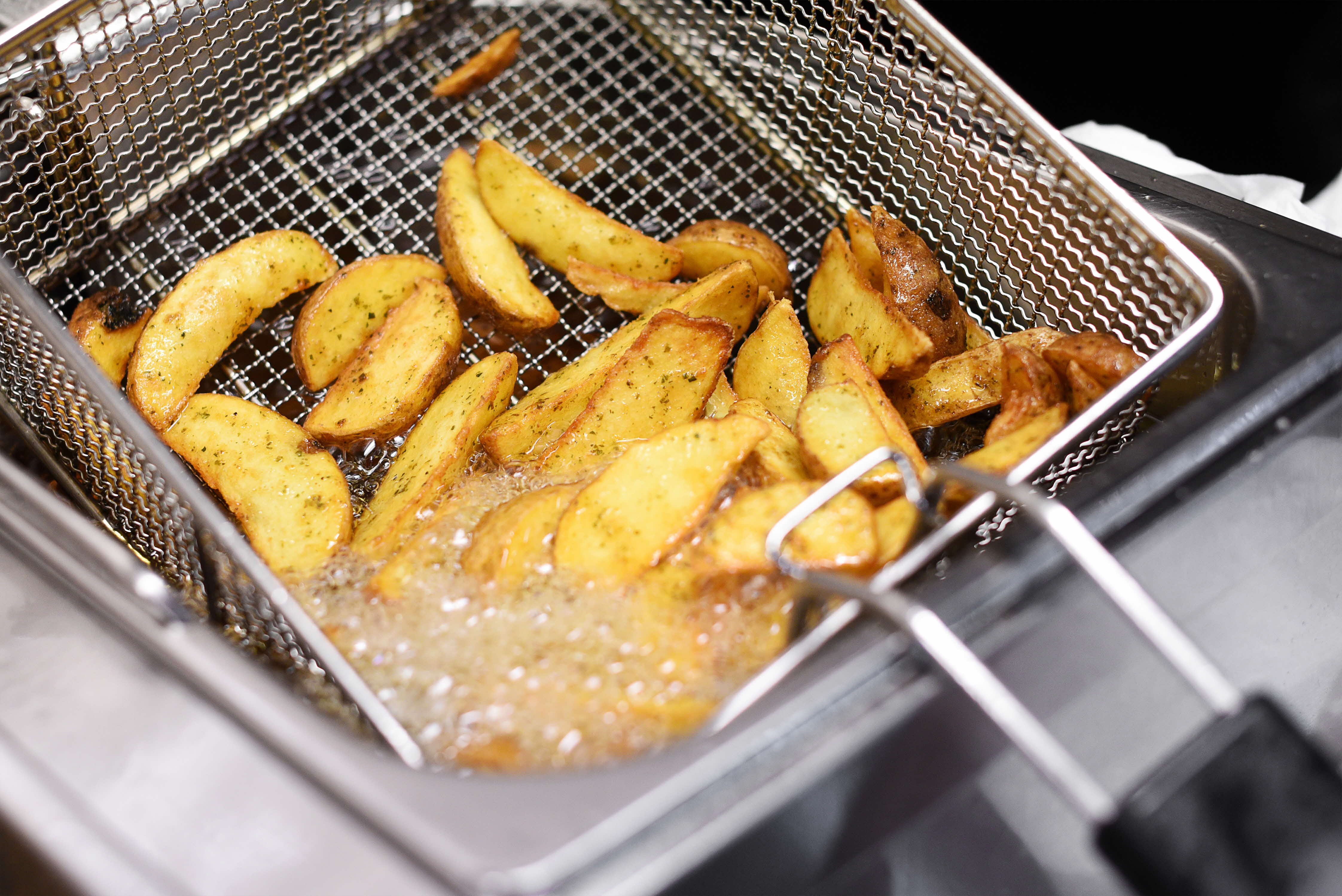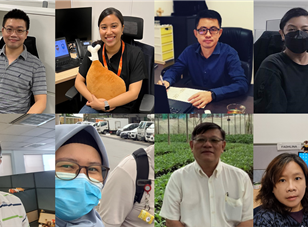
World Food Day 2022 turns the spotlight to global hunger and food safety with its theme ‘Leave no one Behind’. Source: FAO
Every year, the world produces more than enough food to feed the global population. Yet in the State of Food Security and Nutrition in the World 2022 report, it is estimated between 702 and 828 million people still went hungry in 2021. The problem lies in the unequal distribution and access to sufficient safe and nutritious food. This is further compounded by the COVID-19 pandemic, conflicts, and climate change causing global supply chain disruptions in recent years
To turn the spotlight on the existential global food challenges, the United Nations’ Food and Agriculture Organization (FAO) designated 16 October as World Food Day. Summarised in this year’s theme ‘Leave no one Behind’, the day calls for worldwide awareness and action to enhance global food security and food safety for all. The scale of this, however, requires collaboration and joint efforts by countries globally.
Despite being a small country, Singapore is an active player in the international community when it comes to advancing the global food agenda. We work closely with our partners through collaborations on capacity building and contributing to the setting of international food safety standards to safeguard and advance global food security and safety.
Collaborating towards a more secure food supply
It takes many small steps to achieve an ambitious goal. To enhance food security, Singapore has forged a series of collaborations and partnerships with countries around the globe, including knowledge sharing initiatives which leverage promising innovations and technology to boost food quality and production.
Close to home, Singapore is working with our regional neighbours such as Brunei Darussalam to facilitate agri-trade and boost agriculture productivity through technology. A Memorandum of Understanding (MOU) was signed in 2021 between the Singapore Food Agency (SFA) and Brunei Darussalam’s Ministry of Primary Resources and Tourism (MPRT) to enhance bilateral cooperation in the fields of agri-food and agro-technology. Since the signing of the MOU, there have been regular information and knowledge exchange as well as capacity building activities between SFA and MPRT.

The MOU highlights the positive relationship between Singapore and Brunei Darussalam and demonstrates our joint commitment towards food issues.
Besides regional partnerships, Singapore also encourages agricultural innovations on the international stage.
SFA has been supporting the Cultiv@te Programme, initiated by the United Nations Development Programme (UNDP) Global Centre for Technology, Innovation and Sustainable Development (GC_TISD). The programme reached out to innovators and multi-sector partners around the world to crowdsource innovative and technological solutions to address sustainability challenges in agriculture. SFA tapped on UNDP’s network and global outreach to explore innovative solutions for our urban agricultural needs. One of them was Phytochem Consulting, a Canadian start-up specialising in plant science and production. SFA worked with them to conduct internal test-bedding and provided feedback on their Wely Device, an Internet of Things (IoT) tool that provides real-time measurement of weight as plants grow and potentially improve irrigation and disease management on farms. Through the UNDP platform, we can also contribute the Singapore perspective to facilitate development of food solutions for the world.
Our industry players also share their expertise in agri-food technology with other countries globally. For example, a local vertical farm, Sky Greens, has exported its patented vertical farming model to farms in countries such as China, Malaysia, Vietnam, Thailand, Canada and Portugal. The patented vertical farming system, which can be up to 9 metres tall with 38 tiers of growing troughs, can contribute to higher yield and quality using less energy and water. With the system harnessing mainly natural sunlight, only 40W electricity is required for power, while the water is recycled and reused.

Sky Greens’ patented vertical farming system is shared with other countries to enhance global agri-food productivity.
Food safety is everyone’s business
Purely producing sufficient food for all isn’t enough if food safety is not assured. According to the FAO publication on climate change and its impact on food safety, 14 per cent of food worldwide does not reach consumers partially due to food contamination issues. With climate change expected to further decrease the nutrient content of various staple foods, coupled with the prevalence of foodborne hazards, more food contamination issues are projected to arise.
This is where the Codex Alimentarius Commission, or Codex, comes in. As the international food standards setting body established by the FAO and the World Health Organisation (WHO), Codex’s mandate is to protect consumers’ health and ensure fair practices in the food trade. As a member of Codex, Singapore has a National Codex Office (NCO) tasked with facilitating international food safety standard setting and advocate greater adoption of these standards by more countries. SFA regularly provides monitoring data on levels of common foodborne chemical contaminants and natural toxins in food as well as scientific opinions for supporting dietary risk assessment and Codex food standard setting, which serve to enhance food safety and food trade for the global community.
National Centre for Food Science (NCFS) - Building Regional and International Food Safety Capacity Did you know the WHO ropes in national institutions around the world as Collaborating Centres to tap on their knowledge, resources and expertise in areas such as communicable diseases, nutrition, chronic diseases, and health technologies so as to shape the international health agenda?
One such designated Collaborating Centres is SFA’s National Centre for Food Science (NCFS). As one of only two WHO designated collaborating centres for foodborne contaminants, NCFS serves as the regional knowledge and technical resource centre for WHO in the Western Pacific region. As a WHO Collaborating Centre, NCFS serves dual functions. Firstly, to contribute data from Singapore’s surveillance monitoring on chemical contaminants and natural toxins in food. The data is shared with the FAO/WHO Expert Panel to help set Codex food safety standards. Secondly, NCFS provides technical capacity building and consultation services in times of foodborne crises, to investigate food safety incidents in the Western Pacific. In 2021, NCFS assisted in providing food safety advice on countermeasures to methanol poisoning in Cambodia.  NCFS staff conducting laboratory testing on food to determine if there are chemical contaminants and natural toxins. The designation of NCFS as a WHO Collaborating Centre is testament to NCFS’ food testing and research capabilities, as well as recognition of its role as a key player in providing scientific opinion on food safety matters and contributing to international food safety standards setting. Through its collaborations with international and regional counterparts, the centre’s efforts are also integral in gaining global recognition for Singapore’s food safety system. |
Conclusion: Tackling global food security and safety issues together

It takes many helping hands around the globe to ensure safer food for everyone.
Strengthening global food security and safety remains a massive undertaking that no one country or agency can take on alone. Regional and international collaborations are key to achieving this. At the same time, external collaboration can bring about benefits back home. For example, through raising international food safety standards together, more sources of safe food become available to Singapore and the rest of the world, which will allow us to diversify further and in turn boost our food security. By contributing specialised knowledge, expertise and resources, Singapore not only fulfils its role as a good neighbour, but also its duty as a responsible global citizen working towards a world that leaves no one behind.


 SFA’s National Centre for Food Science (NCFS) is the regional knowledge and technical resource centre for WHO in the Western Pacific region.
SFA’s National Centre for Food Science (NCFS) is the regional knowledge and technical resource centre for WHO in the Western Pacific region.
.tmb-308_227.jpg?Culture=en)


